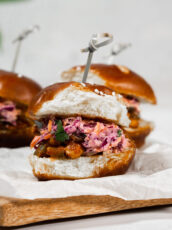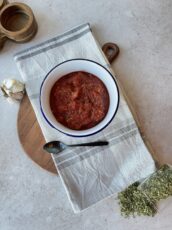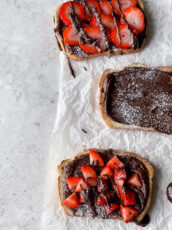
I started my first pregnancy being very healthy. I was in the best shape of my life, my weight was exactly where I wanted it, I had a very healthy diet, and I always had tons of energy. I had only been slightly overweight (around 20-30 lbs) a couple of times due to injuries. After I recovered from them I very quickly lost the weight and was back in shape in no time. Even though I didn’t have any complications during my first pregnancy, I still wasn’t able to work out. I had tachycardia really bad and my heart rate would shoot up even if I stood up. Even walking up the stairs was a huge challenge.
When it came to cooking, I cooked most of my meals until about half way through the second trimester, when my feet, back, and hips hurt WAY too much to stand up long enough to make a full meal. I had recently moved to a place where there is no healthy grocery shops or healthy restaurants around. The nearest Whole Foods or healthy place to eat was 2+ hours away and all that was around me was fast food. I decided that until I was able to cook all of my meals again, I would eat out. I didn’t stop cooking altogether, but I still ate out at least once a day (I’m also GF, so this was pretty tough!). Since I’ve always been able to lose weight rather quickly, I honestly didn’t think this would be as big of a deal as it turned out to be. I pictured myself getting back into shape within 2-3 months.
Things were going fine until I hit the third trimester. My body started packing on the pounds. Fast. My body felt like it was blowing up. After giving birth and losing all of the “baby weight” I had discovered that I had gained 30-40lbs of real, non-baby related weight. After the doctor gave me the ok I started working out. Hard. I did 2, 20 minute HIIT workouts a day, 6 days a week for 3 months. I also changed my diet back to the way I was eating before. In my mind this would be enough to lose the weight that I had put on, but after 3 months, nothing. I quit doing HIIT and purchased a spin bike. I had been into cycling before and I loved it, so I thought that would maybe be the answer. After a few months, still nothing.
After going through various workouts only to find nothing was working, I soon decided to start adjusting my diet. I started a high protein/low carb diet, which didn’t work. I tried various meal plans, which didn’t work. I even went on this ridiculous diet called the military diet, which ultimately didn’t work (I lost a few pounds, but it’s an unsustainable diet, so as soon as I stopped the weight came right back). Needless to say, as someone who has never had a weight problem, my self confidence was all but gone. I was embarrassed to be around my husband, embarrassed to go to the store, or being in public in general, embarrassed to visit family and friends back home. When traveling back home I often didn’t tell anyone other than my immediate family that I was visiting, because I was so embarrassed to be seen. I couldn’t fit into any of my clothes, and often wore long sleeved baggy shirts (even in the summer) to hide myself. Obviously at this point I was getting pretty depressed.
One day I randomly came across a health coach’s account on instagram (shout out to Robyn Youkilis!) who focused on gut health. Having been a former microbiology major (I decided to take a break until after having kids, because physics, calculus, and chemistry all in the same semester while being pregnant is not a good combination!) and lifelong health nut, I was instantly intrigued. I did a lot of research and read so many stories of women who did all the right things with their diet and exercise, but still could not lose their weight. I finally made the connection that being pregnant, having a c-section, and 2 months later having my gallbladder taken out could have taken its toll on my gut microbiome. Having had 2 surgeries within a couple of months time meant having TONS of antibiotics, and I learned that antibiotics wipe out the good bacteria along with the bad bacteria. This can cause an imbalance in the gut microbiota, which can play a major role in whether someone is obese or slender, and many other things.
I also learned that your gut microbiome changes during pregnancy. Especially during the third trimester. Over the course of pregnancy the gut microbiota gradually loses its diversity. During the third trimester the mother’s gut microbiota shifts over to having an obese/high inflammatory community. This means that the mother is able to put on weight very quickly, and is prone to more inflammation than normal (think swollen feet/hands, achy back and hips, etc). If you have to have rounds of antibiotics during this time as I did (twice!) it can potentially cause a major imbalance in your gut flora that can leave you with these communities of microbes being the dominant type for a longer period of time. This can cause issues such as gaining a lot of weight quickly, and not being able to work it off, even if you are eating “healthy”.
Even if you aren’t pregnant this can still be an issue. Many people have taken a lot of antibiotics throughout the course of their life. Having many rounds of antibiotics throughout your life in combination with eating the Standard American Diet is setting your gut microbiome up for obesity and inflammation. If you are one of the many people who are overweight and can’t seem to work it off even with a “healthy” diet, then it may be time to take a look at your gut health.
With this new information, I changed my diet to more gut microbe friendly foods, and over the course of a few weeks I started losing weight again! I was finally getting back to my normal self, even if it was slowly. Not long after that, I discovered that I was pregnant with our second little boy! I’m currently in the middle of my third trimester, and with this information it could not be more different than my first experience. I have a lot more energy this time around, I haven’t gained half the weight I had the first time, I don’t have as many aches and pains as I did before, and I have NO bloating, gas, constipation, heartburn, reflux, etc. Seriously, the last time I was pregnant, I pretty much lived off of Tums/Rolaids and this time I don’t need them at all! I can even bend over and pick things off the floor with no issue. I’m also not as tired as before, and I don’t even take naps during the day like many pregnant women need. That being said, I’m over 7 months pregnant, so I definitely have some limitations and a few aches and pains of course, but nothing like before!
I will definitely maintain this new lifestyle after pregnancy and am confident that I will be back to my pre-pregnancy weight soon!
Here is a list of 5 things that you can do, starting today, to improve and balance your gut microbiota:
Sip bone broth– Bone broth is full of gut healing gelatin and amino acids. Gelatin can play a major role in healing the gut because it is capable of repairing intestinal walls and rebuilding the mucosal lining of the intestines. The amino acids found in bone broth can improve the look of our skin and nails, help repair our joints, and help stimulate stomach acid production.
Eat fermented foods-Good quality fermented foods, such as kimchi and sauerkraut, have tons of gut friendly probiotics in order to balance the gut microbiome. Other options include pickles, yogurt, and kombucha. When it comes to fermented foods, homemade is best, and is easy to make! However, if pregnant, it may be wise to only eat a small amount of these foods each day. Since I have been pregnant I have cut out kombucha since it contains small amounts of alcohol. Some women still drink it and they are fine, but I have chosen not to.
Eat lots of fiber– The Standard American Diet does not have enough plant based fiber in it. In fact, it barely has any at all. This can wreak havoc on our gut mucosal lining. There are certain microbes in your gut whose food of choice is plant fiber. When they are starved of fiber they will start eating away at the mucosal lining of your gut. The mucosal lining acts as a barrier between your gut and the inside world of your body. When it is weakened this can affect the immune system, causing an increased amount of inflammation. It also makes it easier for pathogens to enter our bodies, thus making us more prone to certain illnesses. When gut microbes get the fiber they need, they produce vitamins and short chain fatty acids that can nourish the gut lining. Good sources of fiber include oat bran, split peas, black beans, lima beans, onions, garlic, Jerusalem artichoke, leeks, asparagus, etc.
Eat whole grains– Whole grains, not refined grains such as food items containing refined flour. The grain consists of three parts– the endosperm, germ, and the bran. When flour goes through the refining process it is stripped of all but the endosperm which is full of carbohydrates, but without the fiber (which is responsible for the spike in energy you may get from eating breads, pastries, etc). Since the nutrients are mainly found in the germ and the bran, sometimes they are added back in. However, the finer the flour the quicker it passes through the digestive system, so finely ground flour gets digested quicker and never reaches the colon, where it is needed. Eating whole grains is one of the ways to ensure the colon gets the fiber it needs. Examples of whole grains are amaranth, oat bran, quinoa, barley, brown rice, and buckwheat.
Eat healthy fat– Yes it’s possible to lose weight and be healthy while eating fat! As long as it’s unsaturated, plant-based fats. These are found in foods such as coconut oil, olive oil, avocados, walnuts, sesame oil, and ghee (which isn’t plant based, but is still considered a healthy fat). Healthy fats found in these foods can give us sustainable energy, which will keep you going all day compared to energy you get from a sugar spike after drinking that latte or eating that morning pastry. Good, plant based fiber is also thought to be more potent when combined with healthy fats.
As always, check with your physician before changing your diet, especially if you are pregnant or experiencing certain health problems. Some dietary changes, such as a diet high in fiber can be contraindicated for certain conditions.
Additional reading-
https://www.gutmicrobiotaforhealth.com/en/breaking-short-chain-fatty-acids-health/
https://www.scientificamerican.com/article/fiber-famished-gut-microbes-linked-to-poor-health1/
https://www.healthline.com/nutrition/why-refined-carbs-are-bad#section3







